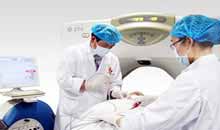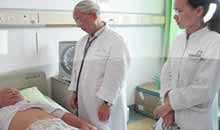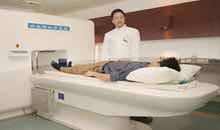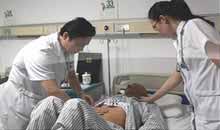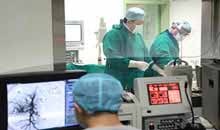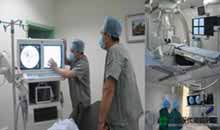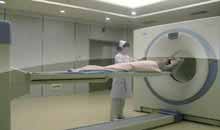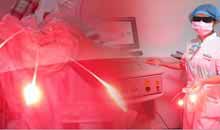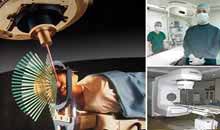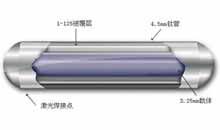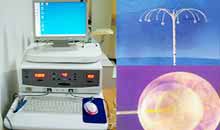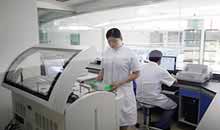- Basic
- Symptoms
- Diagnosis
- Treatments
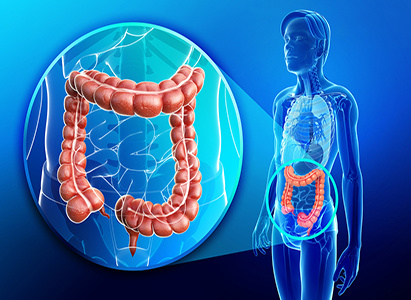
What Is Colon Cancer?
Colon cancer refers to a tumor arising from colonic mucosal epithelium which becomes malignant under the impact of various carcinogenic factors like environment, genetics, etc. It often occurs in rectum and the junction of rectum and sigmoid colon. The incidence rate of colon cancer is second only to gastric and esophageal cancer. Conlon cancer is more common in the people at age of 40 to 50 and patients with colon cancer who are under age of 40 accounts for approximately 15%. The male and female ratio is 2:1.
Causes of Colon Cancer?
1. Diet: diets high in fat or low in fiber are believed to predispose humans to colon cancer.
2. Genetics: if first-degree relatives develop colon cancer, the risk of the next generations developing colon cancer is higher than others.
3. Colon polyps: polyps grow in the inner wall of colon or rectum, which are benign initially but it is likely to become malignant.
4. Crohn’s disease or ulcerative colitis: the risk of developing colon cancer in patients with Crohn’s disease or ulcerative colitis is 30 times higher than others.
Who are High-risk Populations?
1. The population has a history of familial polyposis.
2. The people have first-degree relatives with colon cancer.
3. Occult blood test shows positive in a long term.
4. Patients develop chronic ulcerative colitis.
5. The population has chronic diarrhea or chronic constipation.
Stages of Colon Cancer are:
Stage 0: abnormal cells are found in the wall of colon and colon cancer in this stage is also called primary cancer.
Stage I: Cancer is in the inner layers of colon, invading submucosa
Stage II: Cancer has spread through the muscle wall of the colon, but it has not spread to lymph nodes.
Stage III: Cancer has spread to the lymph nodes around colon, but it has not invaded other parts of body.
Stage IV: Cancer has spread to other organs, such as lung, liver, abdominal wall, ovary, etc.
Reoccurrence: colon cancer reoccurs after treatment and the recurrent regions are colon or other organs.
What does Postoperative Nursing Include?
1. About Clothes: soft, comfortable, elastic clothing should be chosen, in addition, belt should not be too tight so as to avoid pressing the wound.
2. About Bath: after the wound is healed completely, patient can take bath.
3. About Diet: patients need to ensure nutritional balance, eating more fresh fruits and vegetables.
4. About Exercise: appropriate exercise should be done to enhance physical condition and improve cold tolerance and resistance of body.
5. About Mental State: patient should keep optimistic and positive attitude, as well as avoid being depressed and tense.
Colon cancer is a common malignant tumor of digestive tract system and has great threaten to our health. In early stage, colon cancer has no obvious symptoms or just has the symptoms before lesion cancerous change, while as time goes by, a series of symptoms and physical signs would appear.

(1) Abdominal pain and symptoms of digestive tracts: the vast majority of colon cancer patients have different degree of abdominal pain or abdominal discomforts, like abdominal hidden pain, left side abdominal distention, nausea, vomiting, loss of appetite and so on. After food feeding, the symptoms may get worse and sometimes may company with intervallic diarrhea or constipation, which are easily confused with the common diseases of right lower quadrant, like chronic appendicitis, ileocecal tuberculosis, ileocecal junction segmental enteritis or lymphoma. It is generally believed that the symptoms of rightward abdomen colon cancer manifest as pain in the part above navel; while symptoms of leftward abdomen colon cancer manifest as pain in the part under t navel. If cancer tumor penetrates intestine wall, it may cause local inflammatory adhesion or local abscess after the formation of chronic perforation. The location of pain is just the place where tumor localizes.
(2) Abdominal mass: it is usually irregular and in hard texture; its surfaces manifest nodosity; during early stage of transverse colon cancer and sigmoid colon cancer, abdomen mass has a certain activity and may cause pain even press it slightly.
(3) Changes of bowel movement and stool shape: this is due to ulcer or infection caused by tumor necrosis. Because toxin stimulates colon to change bowel evacuation habit: increase or reduce the numbers for bowel evacuation; alternate occurrence of diarrhea and constipation, or occurrence of abdominal colic before bowel evacuation and after that, it would alleviate. If the position of tumor is under or just localizes rectum, then some rectum irritation may appear, like anus bearing-down pain, difficult defecation. Dejecture often manifests as shapeless like pasty, and is mixed with mucus and bloody pus. Sometimes, large amount of blood content may mislead the diagnosis as dysentery, enteritis, bleeding of hemorrhoid and so on.
(4)Anaemia and absorption of chronic toxins: when the surface of tumor necrosis appears ulcer, the colon may suffer from continuously capillary hemorrhage. Blood being mixed with dejecture may fail to catch the attention of colon cancer patients. However, anaemia, emaciation, adynamia or weight loss may be caused due to chronic blood loss, toxin absorption or malnutrition. Advanced stage colon cancer patients may suffer from edema, hepatomegaly, ascites, hypoproteinemia, cachexia and so on. If tumor penetrates stomach or bladder or other organ and cause internal fistula, then similar symptoms shall be also caused.
Now you may have certain knowledge about the symptoms of colon cancer, if there is any further questions, welcome to Modern Cancer Hospital Guangzhou for consultation. Knowing well the symptoms of colon cancer is so helpful for detection and timely treatments, also the therapeutic effects can be remarkably improved and the survival time would be prolonged as well.
The symptoms of colon cancer in early stage are ofen mild or subtle, which are unnoticeable with patients and easily misdiagnosed. Therefore, it should be alerted for middle aged people or above with symptoms as follow, which could be colon cancer: change of habit of bowel movement over a short period of time, such as diarrhea, constipation, or unsmooth bowel movement, persistent abdominal discomfort, vague pain or bloating; loose stool, the presence of blood or mucus in stool; repeated positive in occult blood test; unidentified anemia, week or weight loss, mass palpable in abdomen.

Any of these symptoms requires systemic health checks to exclude the possiblity of colon cancer apart from consultation with the doctor about medical history and physical examination.
Common diagnostic means for colon cancer
1. CEA (Serum Carcinoembryonic antigen) measurement: nonspecific to the diagnosis of colon cancer. An increased level is associated with bigger size of tumor, which will go back to normal level followed by total resection of colon cancer and rebounce to an increased level weeks before recurrence. Therefore, it can help evaluate prognosis and monitoring therapeutic effects and recurrence. CEA is the most commonly used means for diagnosis of colon cancer.
2. Ultrasonography, CT scan or MRI: any of these three means can not determine the diagnosis of colon cancer, however, it has advantages of identifying location of tumor, size and relation to surrounding tissues, lymph node and liver metastases. It is mainly used to determine the infitration into intestinal canal and presence of local lymph node or distal organ metastses.
3. Stool test: M2-PK level in the stool from colon cancer patient is 14 times that that from normal people. Therefore, M2-PK test can be a new innovative method for screening colon cancer.
4. X ray: consists of entire digestive tract Barium test and Barium enema. X ray can get a overal picture of colon appearance, the presence of multiple polypt and multi-cancer lesions and serves as evidence for surgery.At early stage, there might be rigidity of intestinal wall, mucous membrane destruction, then, permenant filling defect, stenosis of intestinal canal. Double contrast gas barium can achieve better results.
Colon cancer specilists at Modern Cancer Hospital Guangzhou alert that patients should undergo overal examinations and treatment as soon as possible.
Colon cancer impacts much to patients. At present, surgeries, chemotherapies and cell immunity, etc. can advance patients’ living treatment and reduce impact on patients to make a better recovery and faster free from disease.
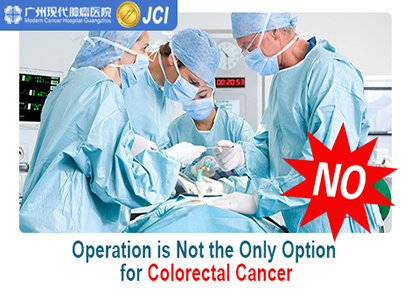
Traditional Theapies
Surgery
It emphasizes firstly resection. But pre-resection combined treatment like chemotherapy and radiotherapy has to be linked to increase resection rate and survival rate and lower recurrence rate after resection.
Chemotherapy
Metastasis and recurrence could occur to almost half of the patients after surgery. Patients in terminal stage and after resection except parts of those in early stage should go through chemotherapy. Chemotherapy is another important method.
1.Systemic intravenous combined chemotherapy.It is mainly based on 5-FU affiliated with conditioner, FH4 to enhance effect of 5-FU
2.Chemotherapy by oral.It mainly refers to prodrug like fluoropyrimidine, which after absorption, can change to 5-Fluorouracil via once or multiple metabolization for anticarcinoma. Chemotherapy by oral has high clinical effect, less side effect, convenience, and availability for out-patient treatment. It is beneficial for elder tumor patients and home chemotherapy, which makes it a new, affiliated therapeutic trend.
New Technology –Cell Immunity Therapy
With development of new technologies, more therapeutic options have come true. Cell immunity therapy, the remarkable achievement of contemporary highly-precise and advanced medical sector, takes on prominent therapeutic effect.
Expert from Modern Cancer Hospital GuangZhou refers that cell immunotherapy is to treat tumor diseases by using TC-well-indentified and restrained immunocell, which is to cure diseases by their own cell. Generally, growth of immunologic cell will get restricted when TC is extending, so culturing immunologic cell outside the body, infuse into the body and finally kill TC systematically is necessary and required. Because of systemic treatment for tumor, and unobvious side effect, cell immunotherapy is presently the most effective and safest affiliated therapy.
Cell immunotherapy mainly is to extract immunologic cell (DC-CIK) in the body, culture it outside the body and reinfuse much to the body in order to regulate immunity functions, enhance antitumor capability, and completely kill tumor cell. Eventually cancer will be cured.
Interventional therapy
Interventional therapy is a mini-invasive therapy performed under the guidance of medical imaging equipments. With a 1-2 millimeter incision, paracentesis could be performed with the lead of medical imaging equipment. Then a special tube, catheter or other sophisticated apparatus are introduced into human body to treat the lesion, so as to cut off the cancer’s blood supply. Interventional therapy is widely applied in the diagnosis and treatment of colon cancer. There are many successful cases in Modern Cancer Hospital Guangzhou.
Combination of TCM (Traditional Chinese Medicine) and Western Medicine Therapy
Modern Cancer Hospital Guangzhou applies combined treatment of TCM & western medicine therapy, which is featuring combined strength of two medicines and advantages of employing brand-new therapeutic system to achieve better effect and lessen side effect. Minimal invasion is the crucial idea of targeted therapy, while finding the most fundamental aetiological agents to treat diseases is the greatest advantage. Hence we can achieve the best therapeutic effect. Additionally, traditional Chinese medicine balances impaired health systematically to combat cancer, enhance immunity and build up health.
Advantages mainly cover two aspects:
Firstly, it is systemically increase immunity, not regionally.
Secondly, it can effectively and completely eliminate cancer cells, by which recurrence and resulted phenomenon of metastases can be avoided.
If you have any questions, please contact us via online consultation, email or phone call. If you find our website useful, please follow our FaceBook and YouTube, health information will be updated regularly.





